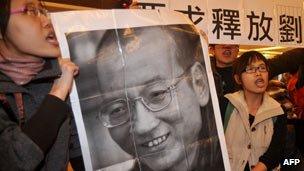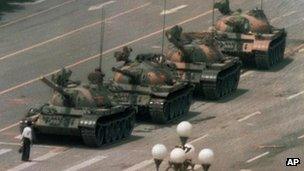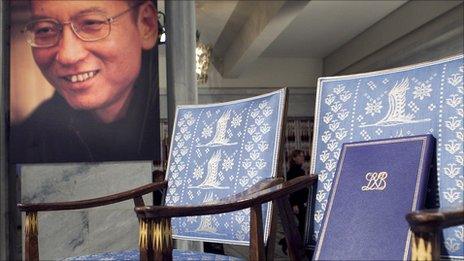When words are crimes in China
- Published
- comments

The veteran dissident Liu Xiaobo was imprisoned at the start of the current crackdown
In under a month, three men have been convicted and jailed for between nine and 10 years each.
Their crime? Writing articles that criticise China's political system and the Communist Party that sits at the apex of power. One more writer awaits trial.
So who are the targets? What's so dangerous about them? And why is this happening?
Li Tie is the latest to be jailed. The 52-year-old was sentenced to 10 years in prison on Wednesday by a court in Wuhan.
He was found guilty of the extremely serious crime of "subversion of state power", essentially the act of undermining the Communist Party and its right to rule.
Although "subversion" would usually imply actions that endanger the state, the basis of his conviction, according to his family, was not what he did, but what he wrote and said.
'Anti-government thoughts'
The campaign group Chinese Human Rights Defenders (CHRD) said Li Tie's relatives reported that the evidence presented against him at his trial included articles he wrote criticising the government - some published overseas - contributions he made to online discussions, and comments he made at gatherings of friends.
CHRD said that, according to Mr Li's family, the prosecutors claimed his words demonstrated "anti-government thoughts" and it should be presumed he would take part in "anti-government actions".
One of the articles cited at the trial was titled Human Paradise Is Where Humans Have Dignity, written by Li Tie in March 2008 and published online.
In it, he makes a clear reference to the Tiananmen Massacre of 1989, still a taboo subject that many writers don't dare address openly. That is one reason why he may have been seen as worthy of such harsh punishment.
"Nineteen years ago, gunshots. Many young people's lives were taken; they were for democracy, against corruption. Until today, the exact number of casualties has yet to be released.
"Listen, those gunshots still ring out in our ears. Everyone who heard them, are you awake? Stand straight, fellow compatriots, don't fall down," he wrote.
In the same article, Li Tie compares today's Communist Party rule with an earlier period of Chinese history, widely regarded as a time of cruelty and repression.
"Speeches are restricted, the internet is blocked, websites can be shut down, sensitive words deleted. This makes one wonder whether we have gone back in time to the West Zhou dynasty.
"The Zhou Li emperor was corrupt, monopolised all resources. Ordinary people were forbidden from cutting wood and hunting; people's speech was monitored."
And he goes on: "In 841 BC, revolutions erupted. Ordinary people and slaves took up weapons and assaulted the royal court. The Zhou emperor was chased away and a republic was established. But has China's Zhou emperor been chased away? Chinese people don't dare to say; can they only stare angrily?"
Chinese artists often talks about past dynasties when they want to address sensitive issues today. Few draw the comparisons so bluntly. But writers more often face charges of "incitement to subversion" rather than of 'subversion' itself.
Li Tie's supporters say he has spent the past decade writing articles calling for democracy, constitutional government and direct local elections in China. So why, you might ask, has he been targeted now?
Nobel prize
Lie Tie was actually detained in September 2010. He was not tried until April 2011. The verdict has just been delivered, almost a year later - a violation of China's legal procedures, according to CHRD.
But his arrest came at a time when China was beginning its current crackdown on internal critics.
The veteran dissident Liu Xiaobo had already been detained for writing Charter '08, a call for constitutional democracy in China, and given an 11-year sentence for "inciting subversion".
When Liu Xiaobo was then awarded the Nobel Peace Prize for what the Nobel Committee called his "long and non-violent struggle for fundamental human rights in China", China's leaders viewed it as a hostile act, a Western-sponsored attempt to undermine the Chinese state.
Ever since, writers, lawyers, artists and activists have been under growing pressure. Many have found themselves detained or jailed.
In Human Paradise Is Where Humans Have Dignity, Li Tie was openly critical of the Communist Party, writing that: "China's revolutionaries have again established a new system of enslavement. This is sad for my country and people. History is repeating itself."
And he talks of the need for free speech: "In China's history, so many people have been sent to prison for what they said and wrote. Freedom of speech is what people cry for from their hearts. It is people's dignity and right."
Leaders 'fearful'
Since he wrote that, the crackdown in China has escalated.
The US ambassador to China, Gary Locke, told a TV interviewer this week that "the human rights climate in China has always ebbed and flowed... but we seem to be in a down period and it's getting worse."
Mr Locke said it was clear China's leaders were unnerved by calls on the internet last year for Chinese people to stage their own Arab-style "jasmine revolution", despite the fact that few people heeded the calls.
"The Chinese leaders are very fearful of something similar happening within China. So there's been a significant crackdown on dissent, political discussion, even the rights and the activities of lawyers who advocate on behalf of people who have been poisoned from tainted food and medicines."
China's government says there is no crackdown. A foreign ministry spokesman, Liu Weimin, said this week that the ambassador's comments were "inconsistent with the facts".
"As to some people who have been punished by law," said Mr Liu, "it is not because China is repressing freedom of expression or freedom of religion, it is because they reached the bottom line of China's law and violated China's laws and, naturally, they should be punished.
"This has nothing to do with so-called human rights," he said.
In the last month, two more long-time activists have also received extended jail terms for publishing articles on the internet.
Chen Wei, a veteran democracy activist, was sentenced to nine years for "inciting subversion" on 23 December. He, too, had written critically of the Communist Party.
"We think autocratic rulers are simple and stupid," he wrote.
"But their objectives are clear. To gain the maximum benefit by whatever means necessary. They rely on violence and lies, but without the co-operation and submission of the people, their rule won't last for long."
And he defended Liu Xiaobo. "Liu Xiaobo's award of the Nobel Peace Prize is an acknowledgement from the international society of all the efforts made by Chinese dissidents, as well as criticism of the Chinese government's detention of the dissidents.
"Liu represented the only correct path for Chinese dissidents. The reform of the Chinese society needs more responsible, wise leaders like Liu."

Twenty-three years on, the Tiananmen Square massacre remains a taboo subject
Chen Xi was given a 10-year jail sentence on 26 December. A former factory worker, he had already been jailed twice since 1989 when he supported the Tiananmen demonstrations.
He too had criticised China's political system, writing: "Socialist countries put the nation and the collective interest above individuals. Personal dignity has been peeled clean by the nation. In reality, socialism is the extreme minorities ruling autocratically over the majority."
And he attacked the Communist Party. "The Communist Party is inferior because it has no culture to admit it makes mistakes. Without admitting making mistakes, there is no mechanism of checks and balances to prevent wrongdoings. The fascism of Communism is always believing itself to be correct. "
Insecurities?
Now Zhu Yufu, a 58-year-old veteran human rights activist, has also been charged with attempting to subvert the state and awaits trial, according to his lawyer. Mr Zhu has been jailed twice before.
The charges are also reported to relate to a poem he wrote last year at the time of the Arab Spring and published online. The poem makes reference to the Tiananmen massacre, calling on people to defend their rights:
"It's time
It's time, Chinese people.
The square belongs to everyone
The feet are yours
It's time to use your feet to go to the square and make a choice."
Viewed from outside, China seems to many an increasingly powerful and confident nation.
Inside China, that is hard to square with the way it treat writers and activists who question the orthodoxies of Communist power. Instead, China's crackdown seems to speak of deep-seated insecurities.
Words, it seems, can be dangerous in China, particularly to those who write them.
And as the country prepares to change its top Communist leaders later this year, few expect any let-up in the pressure on its writers.
Being a writer, artist, dissident or critical thinker in China today is an increasingly hazardous occupation.
- Published31 August 2012
- Published9 December 2010
- Published28 November 2011

- Published10 December 2010